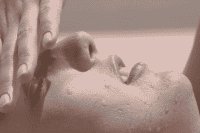Sinus headache relief
What you need is sinus headache relief. Now. You're feeling hot, tired, and congested - and there's this terrible sinus headache. What are your options? Let's take a quick look at sinusitis diagnosis and treatment, and what you can do to find relief.
Source of the sinus headache
First, an important question - what's the source of your headache?
Usually people equate a sinus headache with sinusitis, but many people
(including doctors) are too quick to diagnose before taking a good look
at the symptoms.
Perhaps the most common problem is mistaking migraine for sinusitis.
And when you have a headache, the worst thing you can do is
get the wrong treatment. Congestion, and mucus in the back of your
throat, are common to both migraine and sinusitis. However, more
common with sinusitis is fever, discoloured thick mucus, and a
localized pain around the eyes. With migraine, you often deal with nausea
and a sensitivity to light or sound. A migraine may last a day or two
or even three, but your sinus headache may gradually get worse over a
1-2 weeks. (more on migraine and sinus headache symptoms)

Prevention and early stages
You can get relief in the early stages or even prevent sinus headache
altogether. If you have a cold or allergy symptoms, that's when
sinusitis can strike, due to the congestion. First, if you live in a
dry area or work in a dry environment, consider getting a humidifier.
Make sure to follow the manufacturer's instructions to keep the
humidifier clean. A warm steam spa
is excellent, either when you're sick or to enjoy when you're not!
Using the spa steam several times a day may provide general relief.
And
some of the more obvious things - drink plenty of fluids, for example.
If you're congested because of allergies, talk to your doctor about
appropriate medications, such as a reliable nasal decongestant spray. Or how about something simple? Just blow your nose, gently, one nostril at a time.
Sinus headache relief - later stages
In the later stages, it's even more important to get treatment, not just of the headache but of the source. The infection can spread and do more damage, the longer it's left. If you get recurring sinusitis, lasting for three months or more, it becomes chronic. In this case, you may even require surgery.
As we've already talked about, it's very important to get a correct diagnosis, especially if the symptoms go on week after week, or you're experiencing a new kind of headache. Your doctor will recommend treatment based on your particular situation.
For sinus headache relief, you can try over the counter drugs. Now, none of these will actually cure
sinusitis. Some people
try decongestant capsules for relief. But you may want to try painkillers such as ibuprofen or acetaminophen.
If you find one doesn't help, try the other. But remember, this is a
short term solution. If you find you're not getting sinus headache
relief after a week or two, or the headache is getting worse, see your
doctor.
In some cases, antibiotics may be prescribed. But you must be careful to only take antibiotics if there is a bacterial infection, and this is probably not the case. Even in the case of bacterial infection, it may be better to avoid antibiotics. Your doctor can help you make this decision.
In some cases, if allergies are a major part of the problem, your doctor may want to treat the allergies first.
For more detailed information about treatment options, read How Is Sinusitis Treated? from the National Institute of Allergy and Infectious Diseases.
Read more about sinusitis here.
References: Mayo Clinic article Sinusitis treatment: Can over-the-counter drugs help? 13 Dec 2005; The American Academy of Otalaryngology on What is Sinusitis?; Mayo Clinic information on Acute Sinusitis and sinus headache relief from 14 October 2005; WebMD news article Sinus Headache Symptoms = Migraine? 18 May 2003 by Daniel DeNoon; How Is Sinusitis Treated? 3 April 2013 from the National Institute of Allergy and Infectious Diseases